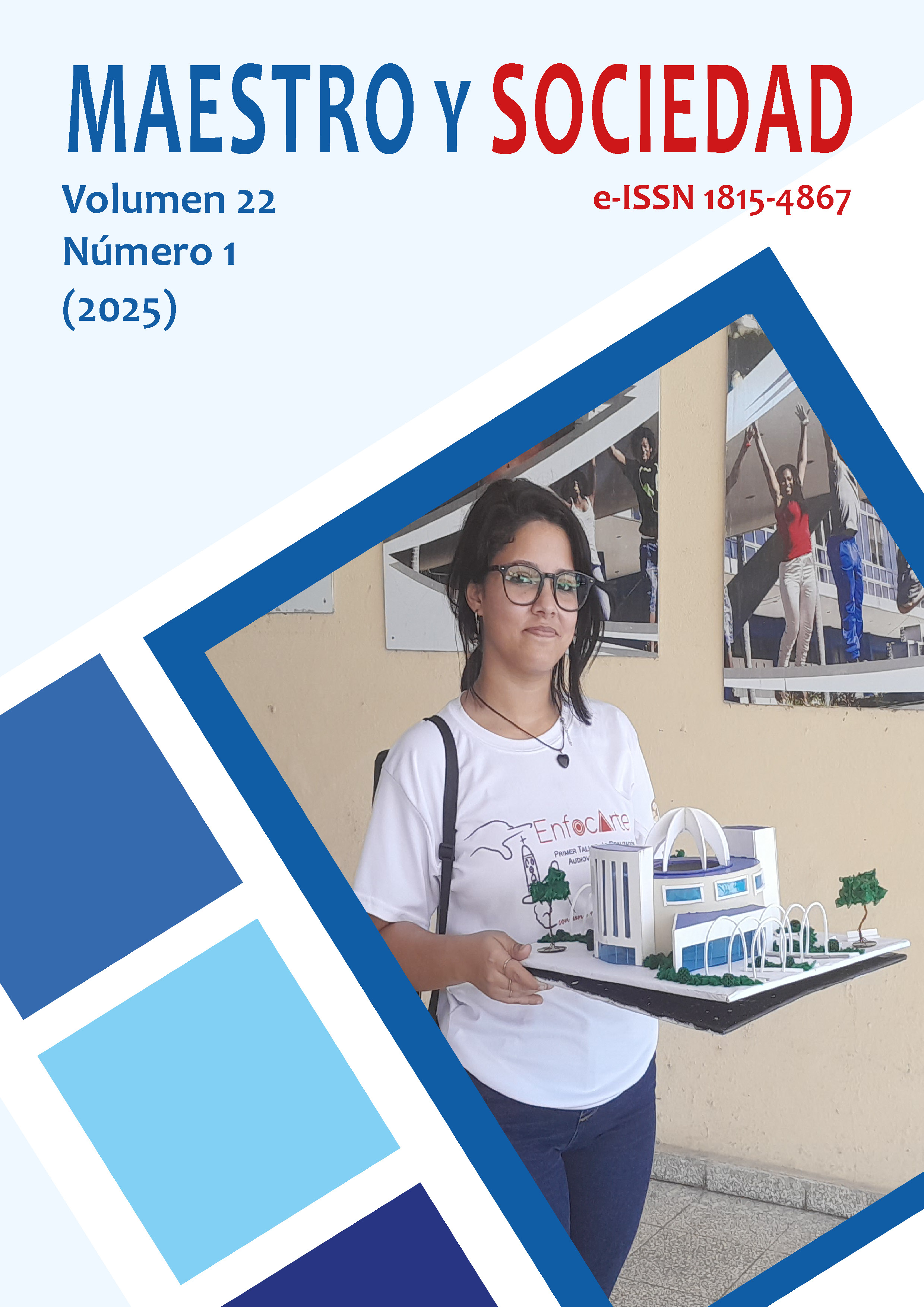Didactic game for the mathematics subject of the ninth year of higher basic education
Keywords:
Didactic games, Teaching strategies, Playful and MathematicsAbstract
Introduction: This study addresses the problem of the use of didactic activities in teaching mathematics in ninth-year students of Higher Basic Education in Ecuador, since there is a low academic performance in that subject, this being evidenced by results of international tests such as PISA and ERCE. Objective: The research, carried out at the Carlos Pomerio Zambrano Educational Unit in Chone, Manabí, explores the use of didactic games as a strategy to improve the teaching and learning of mathematics. Materials and methods: Using a mixed, descriptive and propositional approach, the study collected data from 70 students and 3 teachers through surveys, observations and interviews. Results: a significant percentage of students have difficulties with basic mathematical operations and show interest in learning through educational games. On the other hand, teachers, although they recognize the benefits of play, tend to use traditional teaching methods. Conclusions: Despite the students' disposition towards playful methods, there is a gap in the implementation of these strategies by teachers, possibly due to insufficient training in the use of playful techniques in teaching mathematics. The need to train teachers in teaching-learning methodologies that incorporate playful strategies to improve the construction of mathematical knowledge in students is suggested.
References
Agrasar, M., & Chara, S. (2004). Juegos en Matemáticas (1ra ed.). (N. Sosa, Ed.) Buenos Aires: Ministro de Educación, Ciencia y Tecnología de la Nación. http://www.bnm.me.gov.ar/giga1/documentos/EL001219.pdf
Arriaga, M. (2015). El diagnóstico educativo, una importante herramienta para elevar la calidad de la educación en manos de los docentes. Atenas, 3(31), 63-74. https://www.redalyc.org/articulo.oa?id=478047207007
Arteaga, M. (2013). Problemática del aprendizaje de la matemática de los estudiantes del octavo y noveno año de educación básica del Colegio Nacional la Tingue del Cantón Olmedo Provincia de Loja. [Tesis, Universidad Central del Ecuador]. https://acortar.link/sms6ak
Bravo, S., & Díaz, A. (2020). Metodología para implementar la actividad lúdica en clases de Matemática en la secundaria básica cubana. EduSol, 20(73), 127-137. http://scielo.sld.cu/scielo.php?script=sci_arttext&pid=S1729-80912020000400127
Castellanos, R., Morocho, N., Morocho, L., & Heras, W. (2022). Enseñanza de la matemática a través del diseño universal para el aprendizaje en noveno año de educación general básica. Ecuador. Revista PUCE(113), 95-120. https://www.revistapuce.edu.ec/index.php/revpuce/article/view/404
Chacha, X. (2022). El juego como estrategia didáctica para el desarrollo del pensamiento lógico matemático en los niños de la escuela de educación básica carlos antonio mata coronel de la ciudad de Azogues. [Tesis magister, Universidad Politecnica Salesiana]. https://dspace.ups.edu.ec/bitstream/123456789/22670/1/UPS-CT009813.pdf
Coloma, M., Labanda, M., Michay, G., & Espinosa, W. (2020). Las Tics como herramienta metodológica en matemática. Revista Espacios, 41(11), 7. https://revistaespacios.com/a20v41n11/a20v41n11p07.pdf
Farias, D., & Rojas, F. (2010). Estrategias lúdicas para la enseñanza de la matemática en estudiantes que inician estudios superiores. Paradígma, 31(2), 53-64. https://ve.scielo.org/scielo.php?script=sci_arttext&pid=S1011-22512010000200005
Gamboa, R., & Moreira, T. (2017). Actitudes y creencias hacia las matemáticas: un estudio comparativo entre estudiantes y profesores. Actualidades Investigativas en Educación, 17(1). https://doi.org/10.15517/aie.v17i1.27473
Gómez, M. y Mireles, A. (2019). Cálculo mental como estrategia para el aprendizaje de los contenidos matemáticos en la educación primaria. Revista de Ciencias de la Educación, 3(10), 8-19. https://www.ecorfan.org/republicofperu/research_journals/Revista_de_Ciencias_de_la_Educacion/vol3num10/Revista_Ciencias_de_la_Educaci%C3%B3n_V3_N10_2.pdf
Herra, J. (2014). Enseñanza en Matemática. Vida Científica Boletín Científico De La Escuela Preparatoria, 2(4). https://repository.uaeh.edu.mx/revistas/index.php/prepa4/article/view/1906
Ladino, D., Bejarano, B., Santana, L., Martínez, O., & Cabrera, D. (2018). Diseño de aprendizaje a partir de las posibilidades de las ecologías de aprendizaje en educación superior. Revista Virtual Universidad Católica del Norte, (53), 35-52. https://www.redalyc.org/journal/1942/194259584004/html/
Moreano, G., Asmad, U., Cruz, G., & Cuglievan, G. (2018). Concepciones sobre la enseñanza de matemática en docentes de primaria de escuelas estatales. Revista de psicología, 6(2), 299-334. http://pepsic.bvsalud.org/scielo.php?script=sci_arttext&pid=S0254-92472008000200005#:~:text=Como%20es%20conocido%2C%20la%20ense%C3%B1anza,ense%C3%B1ado%20sin%20discusi%C3%B3n%20ni%20cr%C3%ADtica
Santana-González, Y. (2024). La inteligencia artificial, potencialidad o limitante en el estudio de la Enfermería en Cuba. Revista Cubana de Enfermería, 40, e6571. https://revenfermeria.sld.cu/index.php/enf/article/view/6571
Sepúlveda, A., Díaz, D., & Minte, A. (2019). Deficiente rendimiento en matemática: análisis desde la perspectiva de los alumnos de Educación Básica chilena. Revista Espacios, 40(23). https://www.revistaespacios.com/a19v40n23/19402327.html
Valero, N., & González, J. (2020). Análisis comparativo entre la enseñanza tradicional. Edma 0-6: Educación Matemática en la Infancia, 9(1), 40-61. https://dialnet.unirioja.es/servlet/articulo?codigo=7591905
Zayas, R., Escalona, M., & Cedeño, R. (2022). La enseñanza-aprendizaje de los conceptos de la Matemática Superior. Estrategia para su perfeccionamiento. Luz, 21(3), 99-112. http://scielo.sld.cu/scielo.php?script=sci_abstract&pid=S1814-151X2022000300099
Published
How to Cite
Issue
Section
License
Copyright (c) 2025 María Cecibel Santana Cedeño, María Angélica Henríquez-Coronel

This work is licensed under a Creative Commons Attribution-NonCommercial-NoDerivatives 4.0 International License.
This journal provides immediate open access to its content, based on the principle that offering the public free access to research helps a greater global exchange of knowledge. Each author is responsible for the content of each of their articles.



























 Universidad de Oriente
Universidad de Oriente 